The Ultimate Homemade All-Purpose BBQ Spice Rub: Your Go-To Dry Rub for Flavorful Grilling, Smoking & Roasting
This effortless homemade BBQ spice rub is your secret weapon for elevating any meal, whether you’re grilling, smoking, roasting, or even using your air fryer. It delivers an irresistible bold, smoky-sweet flavor that transforms chicken, pork, ribs, fish, and vegetables into culinary masterpieces. Crafted from common pantry spices, it’s incredibly easy to mix, universally loved, and undeniably superior to any store-bought alternative. Best of all, you gain complete control over the ingredients, ensuring no unwanted preservatives, artificial flavors, or mystery additives ever touch your food.
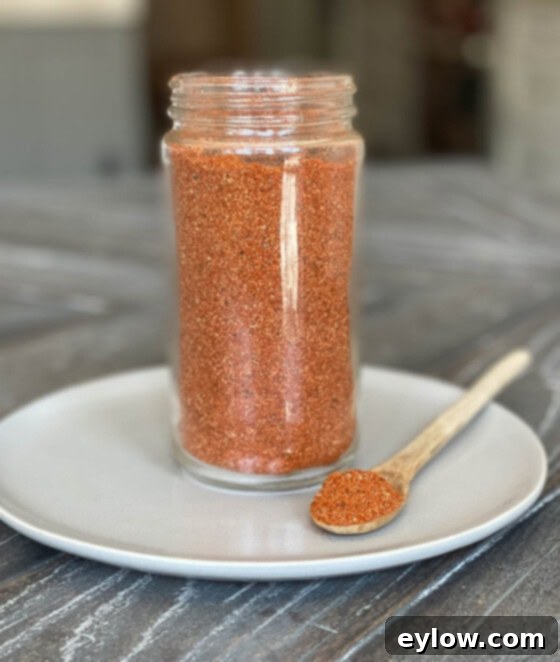
I perfected this BBQ spice rub (also known as a dry rub) over a decade ago and initially shared it with grilling enthusiasts among my friends. Now, this cherished recipe is yours to enjoy. Its truly all-purpose nature means you can generously sprinkle or rub it onto virtually anything destined for the grill, smoker, oven, or air fryer. If you’re passionate about making your own ingredients and maintaining strict control over what you consume—just like I am—this homemade BBQ spice rub is not only simple to prepare but also fully customizable to your taste preferences.
Beyond its incredible flavor, making your own spice blends like this BBQ rub offers a significant advantage in terms of freshness. Store-bought spices can sit on shelves for extended periods, losing their potency and vibrancy. By mixing your own blend from fresh, high-quality individual spices, you ensure maximum flavor impact in every dish. This commitment to fresh ingredients is key to achieving truly exceptional results in your cooking.
[feast_advanced_jump_to]
Why You’ll Absolutely Love This Homemade BBQ Spice Rub
There are countless reasons why this homemade BBQ spice rub will become your new go-to seasoning. It’s more than just a blend of spices; it’s a versatile tool that empowers you in the kitchen and elevates your cooking to new heights. Here’s why you’ll fall in love with it:
- Unmatched Flavor Control: This is arguably the biggest advantage. Commercial rubs often have a fixed flavor profile and can be overly salty or sweet. With this recipe, you are the chef. Crave more heat? Add extra chipotle. Prefer it sweeter for caramelized bark? Increase the brown sugar. Want less salt or a specific type of salt? That’s entirely up to you. You can fine-tune every note—from smokiness and earthiness to sweetness and spice—to perfectly match your dish and personal palate. This level of customization ensures every bite is exactly how you envisioned it.
- Incredibly Versatile & Truly All-Purpose: Forget having a dozen different spice blends for various meats or cooking methods. This dry rub is designed to be your culinary workhorse. It shines on poultry (chicken, turkey), tender cuts of pork (ribs, tenderloin, chops), robust beef (brisket, steaks, burgers), delicate seafood (shrimp, salmon, white fish), and even a wide array of vegetables (potatoes, corn, bell peppers, zucchini). Whether you’re grilling over an open flame, slow-smoking a brisket, roasting in the oven, or quick-cooking in an air fryer, this rub delivers consistent, delicious results every single time. It truly adapts to any protein or preparation method.
- Pure, Clean Ingredients You Trust: Many commercial spice rubs contain hidden ingredients like anti-caking agents, artificial colors, flavor enhancers (such as MSG), or excessive fillers. When you make your own, you use only the finest, freshest, whole spices. This means no preservatives, no mystery additives, and no ingredients you can’t pronounce. It’s a healthier choice for you and your family, allowing you to enjoy bold flavors without compromise. You know exactly what’s going into your food, giving you peace of mind and a superior taste experience.
For another fantastic homemade spice blend that puts store-bought versions to shame, be sure to try my homemade taco seasoning. It’s perfect for making a delicious ground beef taco filling or seasoning any Mexican-inspired dish.
Essential Ingredients for Your DIY BBQ Spice Rub
Gathering the right spices is the first step to creating this exceptional BBQ dry rub. The beauty of this recipe lies in its simplicity; you’ll likely find most of these high-quality spices right in your pantry or at any well-stocked grocery store. For harder-to-find or bulk options, consider reputable online spice stores.
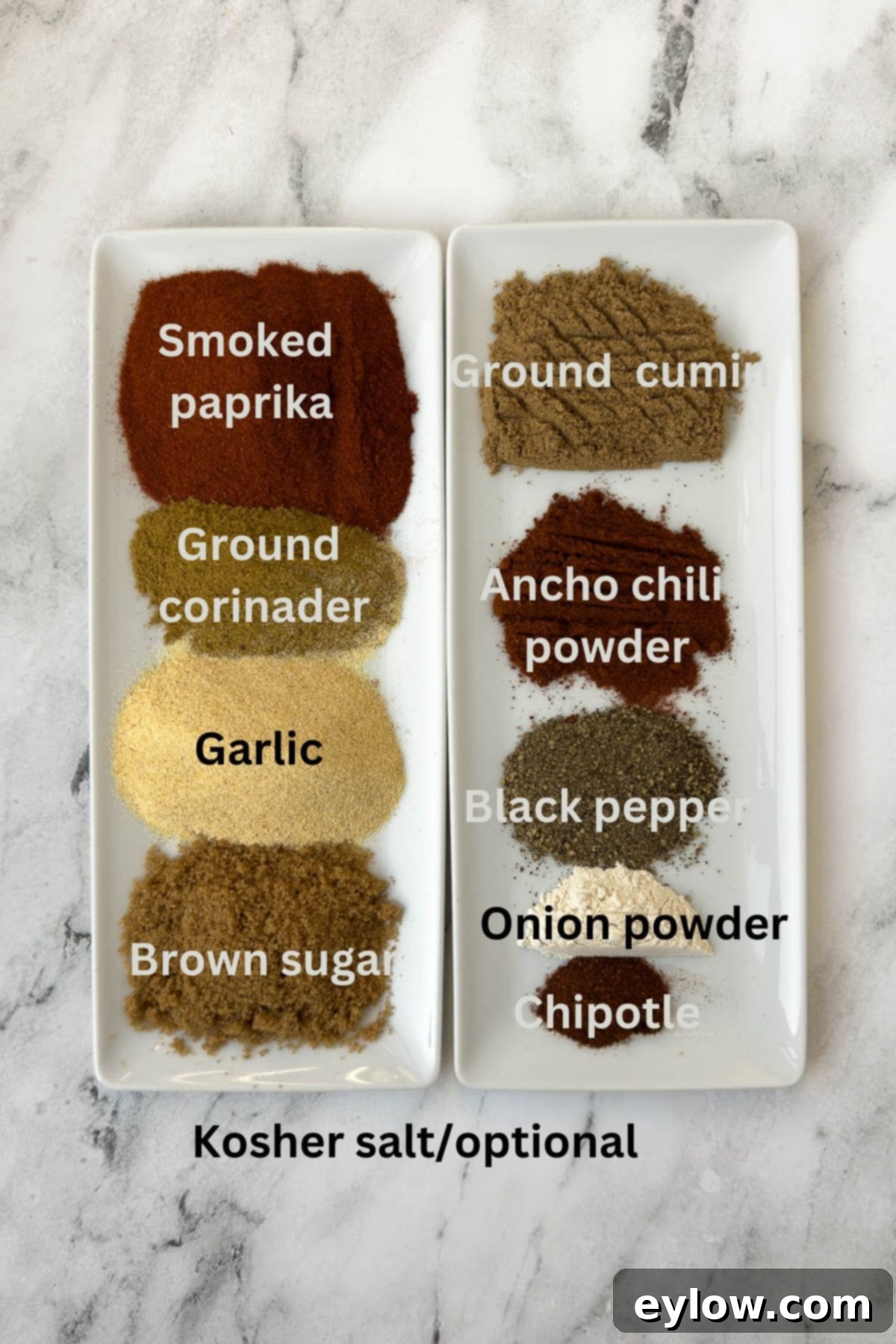
- Smoked Paprika: This is the cornerstone of our rub, providing a rich, earthy, savory, and deep smoky flavor that’s essential for classic BBQ profiles. Unlike sweet or hot paprika, smoked paprika (also known as Pimentón de la Vera) is made from peppers that have been slow-dried over oak fires, imparting an unmistakable depth.
- Granulated Garlic: Granulated garlic offers a potent garlic flavor without the clumps often associated with finer garlic powder. It’s coarser in texture but delivers robust, pure dehydrated garlic goodness. Both granulated garlic and garlic powder are suitable, but note the texture difference—granulated tends to disperse more evenly in a rub.
- Brown Sugar: A touch of brown sugar is crucial for balance and contributes to that desirable caramelization and “bark” on grilled and smoked foods. The molasses in brown sugar adds a subtle depth. You can use light brown sugar for a milder sweetness, dark brown sugar for a richer, more intense molasses note, or even a coarse brown sugar like turbinado for a different texture.
- Ground Cumin: This spice brings a warm, earthy, and slightly pungent flavor that is a hallmark of many savory spice blends and adds significant aromatic complexity. It pairs beautifully with the other spices to create a well-rounded profile.
- Ground Coriander: The perfect companion to cumin, ground coriander offers a bright, subtly citrusy, and slightly floral flavor. It prevents the rub from becoming too heavy and adds a refreshing counterpoint to the smoky and earthy notes.
- Onion Powder: Another vital savory flavor builder, onion powder provides a concentrated onion taste that rounds out the aromatic base of the rub. It’s sweeter and less pungent than fresh onion, ensuring a smooth integration into the blend.
- Ancho Chili Powder: It’s critical to use pure ancho chili powder here, not the blended seasoning commonly labeled “chili powder” (which often contains salt, cumin, garlic, and other spices). Ancho chili powder is made solely from dried poblano peppers, delivering a mild, fruity, slightly sweet, and earthy heat rather than just generic spice.
- Ground Black Pepper: Essential for adding a foundational layer of sharp, pungent heat. Freshly ground black pepper is always best for maximum potency. For an extra layer of complexity, consider using smoked black pepper, which complements the smoked paprika and chipotle beautifully.
- Chipotle Pepper Powder: For an extra kick of smoky heat! Chipotle peppers are smoked and dried jalapeños, making their powder an ideal addition to amplify the overall smoky character of the rub while introducing a pleasant, moderate warmth.
But what about the salt? You might notice salt is conspicuously absent from the primary ingredient list. This is a deliberate choice for maximum control, which I’ll explain in detail below. For precise measurements of all ingredients, please refer to the comprehensive recipe card at the end of this article.
This versatile BBQ spice rub isn’t just for main courses. Get creative! Instead of plain paprika on top of creamy deviled eggs, try a sprinkle of this flavorful blend for an unexpected twist. It makes for an incredibly aromatic and delicious garnish.
Chef’s Tip: Understanding BBQ Rubs
A BBQ rub is a meticulously crafted dry blend of spices, herbs, and often sugar, applied to food primarily before cooking. Its purpose is twofold: to infuse the food with complex flavors and to aid in creating that coveted, crusty exterior known as “bark” on grilled or smoked meats. The sugars caramelize, while the spices form a flavorful crust that locks in juices and enhances texture. A wet rub, on the other hand, begins as a dry rub but incorporates liquid elements such as olive oil, vinegar, beer, bourbon, mustard, mayo, or citrus juice. This added moisture helps the rub adhere, can tenderize, and introduces additional layers of flavor and moisture.
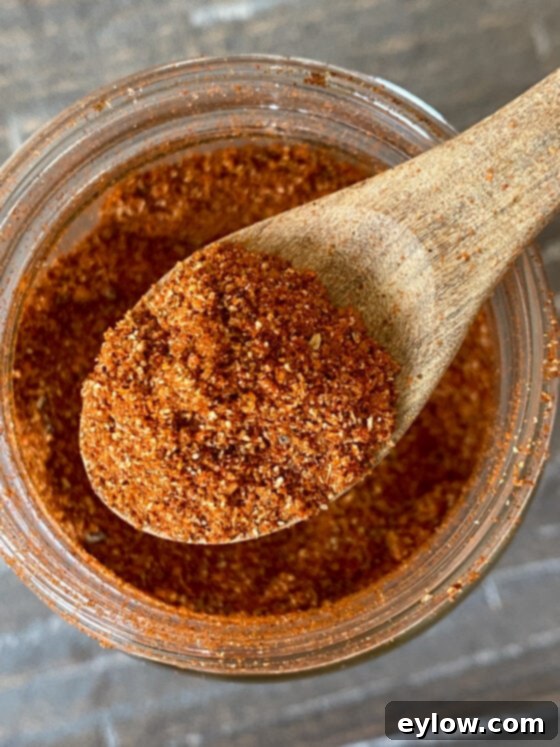
Customizing Your Rub: Substitutions and Flavor Variations
One of the greatest benefits of making your own BBQ spice rub is the ability to customize it to your exact preferences or to work with the ingredients you have on hand. Don’t be afraid to experiment! Here are some tried-and-true substitutions and variations:
- Adding Salt: While I prefer to leave salt out for control, if you like it integrated into your BBQ spice rub, feel free to add 1-2 tablespoons of kosher salt. Use 1 tablespoon for a balanced flavor that allows the spices to shine, or 2 tablespoons for a more salt-forward rub, particularly if you’re seasoning large cuts of meat or ribs.
- Paprika Alternatives: If you don’t have smoked paprika, you can substitute regular sweet paprika. Keep in mind that this will result in a less smoky flavor profile, so you might consider increasing the chipotle powder or adding a dash of liquid smoke to compensate if you still desire a smoky note.
- Smoked Salt for Extra Depth: For an even deeper smoky character, consider using a smoked salt. You can either incorporate it directly into the rub recipe (adjusting other salt levels accordingly) or use it separately when salting your meat. This adds a sophisticated layer of flavor.
- Garlic Powder vs. Granulated Garlic: If you only have garlic powder (which is finer in texture) instead of granulated garlic, use approximately ¾ of the amount specified in the recipe. Because garlic powder is more concentrated and finer, a smaller quantity will deliver a similar flavor intensity and prevent an overpowering garlic taste.
- Heat Adjustments with Cayenne: To substitute chipotle pepper, use cayenne pepper for pure heat. Cayenne is generally spicier than chipotle and lacks its smoky notes. Add it gradually and taste as you go, as its potency can be quite strong. For even more heat, experiment with a pinch of ghost pepper powder, but exercise extreme caution!
- Infusing Dried Herbs: Introduce aromatic complexity by adding dried herbs such as dried thyme, dried oregano, or even a touch of dried rosemary. Start with 2-3 teaspoons, crushing them between your palms before adding to the mix. This releases their essential oils and enhances their flavor.
- Coriander Shortage? No Problem!: If you find yourself without ground coriander, you can simply omit it. The rub will still be delicious, but you might want to use a little more cumin to maintain that earthy depth, or even a touch of ground caraway for a slightly different aromatic twist.
- Sweetener Swaps: For alternative sweeteners, replace brown sugar with coconut sugar for a slightly less refined sweetness, or a golden monk fruit blend for a low-carb, sugar-free option that still provides sweetness and aids in caramelization.
- Want It Sweeter?: If you prefer a richer, sweeter crust or are seasoning something like pork ribs where a sugary glaze is desired, simply add a little more brown sugar to your liking. The sugar helps create that beautiful, caramelized bark.
This dry rub is so versatile, you can even use it to add a smoky, savory dimension to unexpected dishes. Try it in place of plain paprika in this easy, creamy smoked salmon dip for a delightful flavor boost!
Understanding Salt in BBQ Rubs: Why I Keep It Separate
You might have noticed that many store-bought dry rubs list salt as their very first ingredient, often comprising up to 50% or even more of the total blend! This high salt content is often accompanied by an unknown quality or origin of the salt, which can be a concern for many home cooks.
While salt is undeniably critical for enhancing flavor in almost all cooking, I intentionally choose to omit it from my base BBQ spice rub. This decision is driven by a desire for greater culinary control and to cater to diverse dietary needs. Here’s why:
- Precision Control Over Salinity: By applying salt separately, I can precisely control the exact amount of salt that goes onto my meat or other ingredients. Different cuts of meat, varying thicknesses, and diverse cooking methods may require different levels of salt. Salting separately allows for optimal seasoning, preventing over-salting (which is nearly impossible to fix) and ensuring the perfect balance of flavors.
- Flexibility with Salt Types: Leaving the salt out of the rub allows me to use various types of salt for different applications. For instance, when smoking meats on my pellet grill, I often opt for a smoked salt blend to amplify the smoky notes. For quick-cooking items, I might choose a fine grain salt for faster absorption. This flexibility is lost when salt is pre-mixed into the rub.
- Dietary Considerations: Many individuals are salt-sensitive or adhere to medically restrictive diets that limit sodium intake. A salt-free dry rub provides a fantastic, versatile option for these individuals, allowing them to enjoy robust BBQ flavors without compromising their health needs. They can add a minimal amount of salt, or none at all, depending on their dietary requirements, while still experiencing a full spectrum of spices.
So, if you decide you want to add salt directly to your dry rub, what kind should you use? Most people prefer kosher salt for its coarse texture and clean taste, which helps create a desirable crust on meats. You can also use fine pink sea salt, but please read on for more about my preferred salt choices…
My Preferred Salts and Why
In my kitchen, you’ll consistently find three primary types of salt, each chosen for its unique characteristics and applications:
- Coarse Kosher Sea Salt (Mediterranean): My first choice is a Mediterranean coarse kosher sea salt. I value it for its excellent texture, which is easy to pinch and distribute evenly, and its clean, unadulterated flavor. This is my go-to for brining, salting water for blanching or boiling vegetables, and often for pre-salting meats before applying the dry rub. Its crystal size allows for good adherence and gradual dissolution. Another fantastic option in this category is this mined pink kosher salt, which offers a similar coarse texture with added trace minerals.
- Fine Pink Mined Ancient Sea Salt: The other workhorse salt I use extensively is a fine, clean, pink mined ancient sea salt. Its fine grain dissolves quickly and evenly, making it ideal for seasoning at the table, finishing dishes, or when a rapid absorption of salt is desired. The trace minerals contribute a subtle, complex flavor beyond just sodium chloride.
These two types of salt cover nearly all my cooking needs, providing both the texture and flavor profiles necessary for various culinary tasks. When combined with a salt-free BBQ rub, they allow for maximum control and optimal flavor development in every dish.
My absolute favorite recipes to generously apply this BBQ spice rub on include Smoked 3-2-1 baby back ribs, where it forms an incredible bark, and my perfectly seasoned rotisserie chicken for an all-over crispy, flavorful skin.
Effortless Preparation: How to Make Your Homemade BBQ Spice Rub
Making this BBQ spice rub couldn’t be simpler, requiring minimal effort for maximum flavor payoff. It’s a quick process that yields a potent, versatile seasoning blend ready for any cooking adventure.
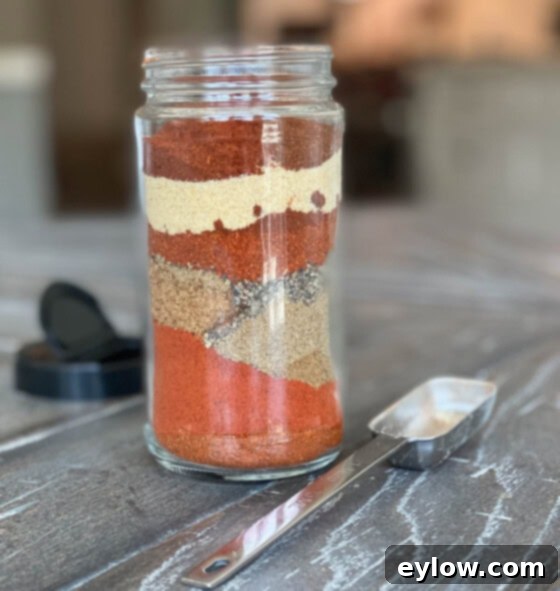
Step-by-Step Instructions:
- Measure Your Spices: Carefully measure all the individual spice ingredients into a clean, dry glass jar or airtight container. Ensure your jar has a tight-fitting lid to prevent moisture and air from degrading the spices.
- Shake and Combine: Once all the spices are in the jar, secure the lid tightly. Then, shake the jar vigorously for at least 30-60 seconds. This ensures all the spices are thoroughly combined and evenly distributed throughout the blend. You want a uniform color and texture, without any pockets of individual spices.
- Label and Store: After mixing, label the jar clearly with the name of the rub (“Homemade BBQ Spice Rub”) and the date you prepared it. This helps you keep track of its freshness. Store your freshly made rub in a cool, dry, and dark place. A pantry or cabinet away from direct sunlight and heat sources is ideal. Stored correctly, it will maintain its peak flavor and potency for up to 4-6 months.
Chef’s Tip: Where NOT to Store Spices?
Proper storage is crucial for preserving the flavor and aroma of your spices. Avoid storing your BBQ rub (or any spices) in locations exposed to full light, on top of your stove, directly beside the stove, or above the range. Heat and light are major enemies of spices; they accelerate the degradation of essential oils, causing the flavors and strength of the spices to diminish much more quickly. Your cool, dark pantry is truly your spice blend’s best friend.
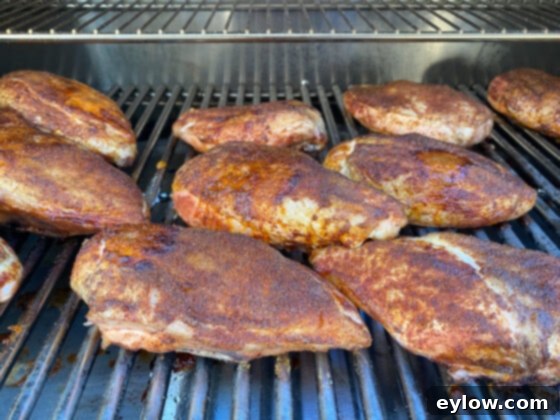
Unleashing Flavor: Creative Ways to Use Your BBQ Spice Rub
This homemade BBQ spice rub is not just for grilling; its multi-purpose and versatile nature means it can elevate a vast array of dishes and cooking methods. Think of it as your secret weapon for adding bold, smoky-sweet flavor to nearly anything. Here are some fantastic ways to incorporate this dry rub into your cooking:
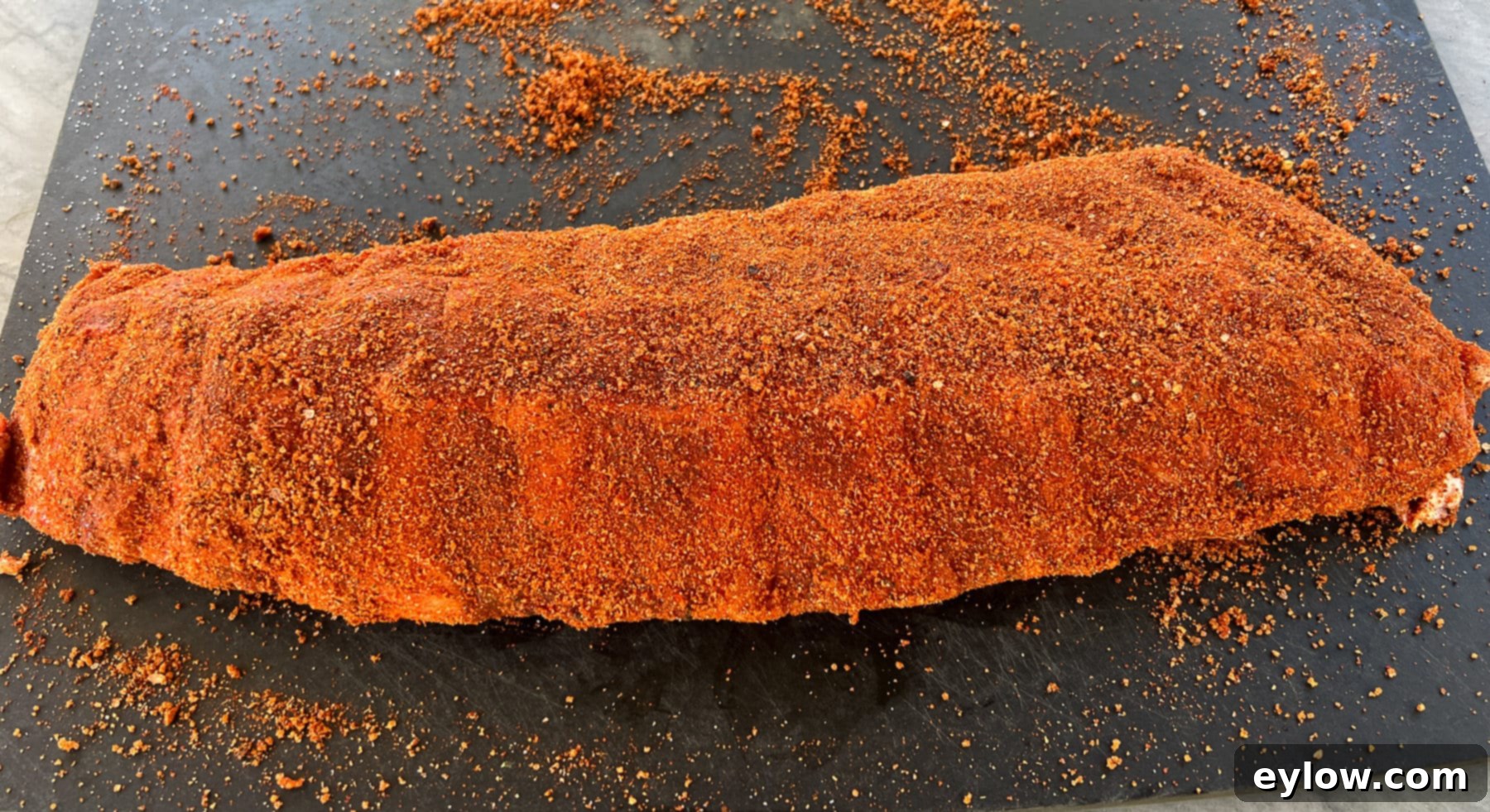
Use this BBQ spice rub recipe liberally on raw proteins, such as chicken pieces (breasts, thighs, whole birds), turkey, full racks of ribs, pork tenderloin and chops, various seafood (shrimp, salmon fillets, cod), and even ground meats for burgers and beef roasts. Beyond proteins, it shines as a finishing seasoning for vegetables, roasted potatoes, and can even be incorporated into homemade vinaigrettes, dressings, and marinades. Its versatility is truly impressive. Try out these specific recipes and applications:
- Baby Back Ribs: For fall-off-the-bone tender and flavorful ribs, generously rub both the top and underside of your baby back ribs with this dry rub. For deeper flavor penetration, I recommend applying the rub the night before and letting the ribs rest in the refrigerator. This allows the spices to meld and tenderize the meat, creating an amazing bark.
- Grilled Shrimp Tacos: Lightly coat raw shrimp with the dry rub before grilling for an explosion of flavor in your grilled shrimp tacos. The rub adds a smoky, zesty kick that perfectly complements the fresh taco ingredients.
- Baked or Pellet-Grilled Chicken: Sprinkle generously on baked bone-in chicken breasts, or use it on any chicken parts destined for the oven or pellet grill. It creates a beautiful golden crust and infuses the chicken with incredible taste.
- Air Fryer Roasted Red Potatoes: Toss cubed red potatoes with a touch of olive oil and a generous amount of this rub before air frying. The result is perfectly crispy, flavorful air fryer roasted red potatoes with a fantastic savory kick.
- Buttered Popcorn: For a surprisingly addictive snack, sprinkle a pinch of this dry rub over freshly buttered popcorn. It adds a gourmet, savory dimension that’s hard to resist.
- A Versatile Paprika Replacement: Use this rub anywhere you would typically use plain paprika to add a more complex, smoky, and seasoned flavor. Think deviled eggs, potato salads, or sprinkled over roasted vegetables.
- Boost Your Marinades: Whisk a tablespoon or two of the BBQ spice rub into a marinade base of olive oil, citrus juices (lemon, lime, orange), and a touch of vinegar. This creates a quick and incredibly flavorful marinade for chicken, pork, or fish.
- Rotisserie Chicken Perfection: This rub is absolutely phenomenal for rotisserie chicken. The trick to getting the rub to adhere perfectly and create an even, crispy skin is to first smear the whole bird with a thin layer of mayonnaise (it acts as a binder), then coat it thoroughly with the dry rub.
- The Perfect Gift: Package a jar of this homemade BBQ spice rub with a nice label, and you have a thoughtful and practical gift for your grilling enthusiasts, smoker friends, and pellet grill aficionados!
The photo below showcases a whole chicken thoroughly coated in this very dry rub, ready for the rotisserie. The results are consistently fantastic—a tender, juicy interior with a beautifully seasoned, crispy exterior. Remember that little mayo trick for the ultimate adherence and crust!
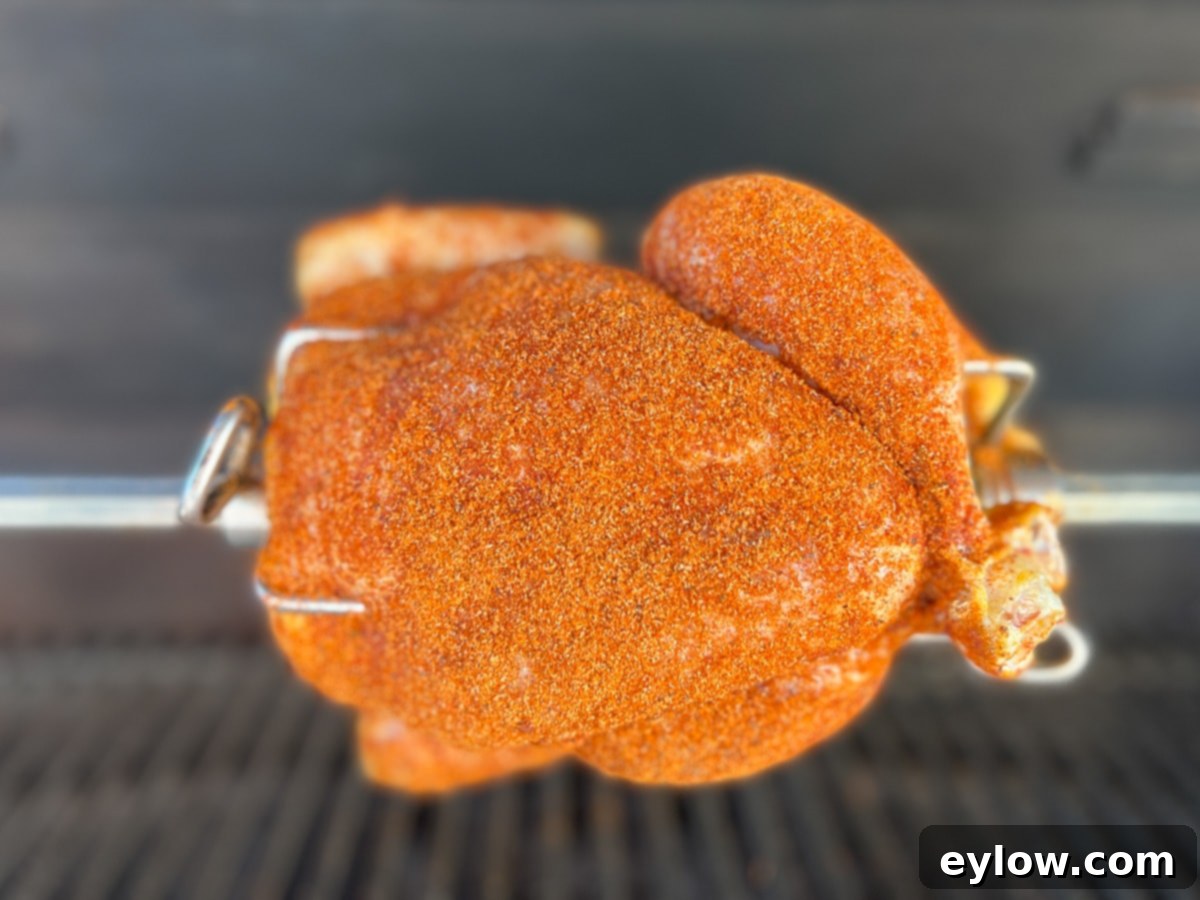
Common Questions About Dry Rubs Answered
Have more questions about dry rubs? We’ve got you covered with answers to some of the most frequently asked questions:
A dry rub is a specialized blend of dry spices, herbs, and often a sweetener like sugar, primarily used to flavor foods before cooking. Unlike marinades or sauces, dry rubs contain no liquids or oils, focusing on creating a flavorful crust and penetrating the surface of the food. They’re designed to add depth, complexity, and a desirable “bark” or crust when applied to meats, particularly during grilling, smoking, or roasting. A key feature of superior homemade dry rubs is the option to omit salt, giving the cook complete control over sodium levels and choice of salt type, allowing for separate salting of meat or seafood. This makes dry rubs incredibly versatile, enjoyable to use, simple to create at home, and capable of imparting tremendous flavor to any recipe.
Indeed, there can be significant health concerns with many commercially purchased dry rubs. The primary issue is often the excessive level of salt; many rubs consist predominantly of salt with very little actual spice. It’s crucial to diligently read labels. The ingredients are listed by weight, so the first few ingredients indicate what the rub is mostly made of – and often, it starts with salt or sugar. Other concerns include the presence of fillers (like silicon dioxide to prevent clumping), artificial flavors, artificial colors, preservatives, and potential allergens like gluten or MSG. These additives can detract from the natural flavors and introduce undesirable elements. Making dry rubs at home effectively eliminates these challenges, providing a healthier, cleaner, and more flavorful seasoning option where you control every component.
Absolutely! Dry rubs are fantastic for seasoning vegetables, adding a whole new dimension of flavor. You can use them in a few ways: either season the vegetables after cooking, much as you would with salt and pepper, or, for deeper flavor, lightly coat or spray vegetables with a little olive oil before tossing them with the dry rub. This helps the spices adhere. Be mindful when cooking dry-rubbed vegetables, especially under high heat (like direct grilling or intense roasting), as the sugars in the rub can burn quickly. It’s often best to use a moderate heat or apply the rub towards the end of the cooking process for delicate vegetables to prevent charring of the spices.
To achieve the best results with dry rubs, it’s helpful to avoid a few common pitfalls. First, always be mindful of the salt levels in your rub (if it contains salt) to prevent your food from becoming overly salty. This is why making your own rub at home is so beneficial, as it allows you to control or entirely eliminate the amount of added salt, giving you flexibility to salt separately. Second, spices, especially those containing sugar, can burn if exposed to excessively high direct heat for too long. Monitor your cooking and grilling temperatures closely, and adjust timings to ensure dry-rubbed food doesn’t scorch, particularly with direct contact cooking methods. Uneven application is another mistake; ensure the rub is distributed evenly over the food surface for consistent flavor and bark development. Finally, always store your dry rub in a cool, dark, airtight container to maintain its potency and flavor for as long as possible.
More Delicious Recipes to Try with This Versatile Dry Rub
Dry rubs are a playground for flavor, inviting you to experiment and infuse new dimensions into your favorite recipes. Anywhere you might typically use a basic spice blend, consider elevating it with this exceptional homemade dry rub. The possibilities are truly endless!
- Baby Back Ribs Recipe (Oven Method)
- Grilled Baja Shrimp Tacos with Avocado Sauce
- Roast Split Chicken Breast
- Air Fryer Red Potatoes (or oven roasted)
⭐️Did You Make This Recipe?
If you make this fantastic homemade dry rub, please share your experience in the comments below! I truly value your feedback and always enjoy hearing from you. If you loved it and found it useful, please consider giving it a 5-star rating! Your ratings and comments genuinely help other readers discover and enjoy this recipe.
📖 Recipe
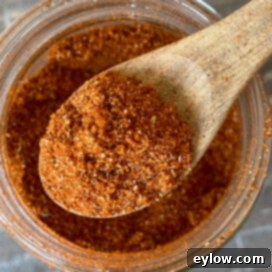
BBQ Spice Rub
Sally Cameron
Pin Recipe
Ingredients
- 4 ½ tablespoons smoked paprika
- 3 tablespoons granulated garlic or 1 ½ T. of garlic powder
- 2 tablespoons brown sugar or coconut sugar or golden monk fruit blend
- 1 ½ tablespoons ground cumin
- 1 ½ tablespoons ground coriander
- 1 tablespoon ancho chili powder
- 1 tablespoon ground black pepper or smoked black pepper
- 1 teaspoon onion powder
- ¼-1/2 teaspoon chipotle powder or cayenne pepper
Optional: Salt
- 1 tablespoon kosher salt
Instructions
-
Measure all ingredients into a jar with a tight lid and shake hard until well combined. Label and date when you made it and store in a cool dark pantry or cabinet. Will last 4-6 months.
Notes
- Like it spicier? Add more chipotle powder, cayenne pepper, or some sharp (hot) paprika.
- If you use garlic powder instead of granulated garlic, start with half the amount as it is finer.